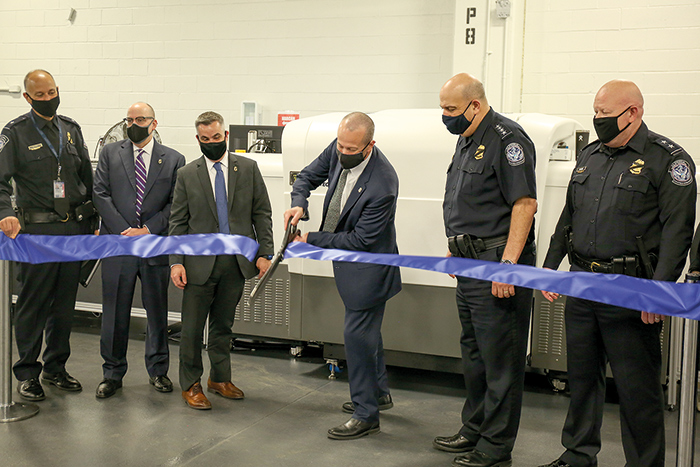Photo Courtesy of CBP
Officials recently cut the ceremonial ribbon on the International Mail Facility at John F. Kennedy International Airport, which recently underwent a multi-million-dollar renovation.
By Michael V. Cusenza
U.S. Customs and Border Protection brass were on-hand Friday to cut the ceremonial ribbon on the International Mail Facility at John F. Kennedy International Airport, which recently underwent a multi-million-dollar renovation.
The ceremony was preceded by a tour of the newly remodeled IMF, with live displays put together by CBP’s Canine, Agriculture, and Intellectual Property Rights teams. The live displays were followed by demonstrations and briefings provided by several of the law enforcement partners CBP works alongside of daily, including the Food and Drug Administration, United States Fish and Wildlife Service, Homeland Security Investigations, and Laboratories and Scientific Services.
The IMF at JFK processes more than half of all the incoming international mail into the United States, roughly one million international letters, packages, and parcels every day. CBP efforts to interdict opioids and other illicit drugs being sent through the U.S. Postal Service have been widely successful, according to officials; however there is always room for improvement. In 2019, CBP had 8,000 drug seizures, which totaled more than 8,000 lbs. of drugs. In 2020, the number of seizures by CBP nearly doubled to 15,000 seizures. Despite these efforts, illicit drugs were still entering the United States. After careful consideration, CBP determined that improving their technological detection systems was the next step forward.
“I am immensely proud to cut this ribbon and step into a new era of narcotics detection and border security. This redesigned space and the new IDSS machines will be critical in our effort to identify and disrupt the transnational criminal organizations that ship these deadly drugs through our international mail system. I am pleased by the outstanding work that happens in this building day in and day out, from countless narcotic seizures to keeping up with the explosive growth of e-commerce before and during the COVID-19 pandemic. I look forward to seeing what will develop with this new technology,” said Troy Miller, Senior Official Performing the Duties of CBP Commissioner.
According to the Centers for Disease Control and Prevention, in 2018, more than 67,000 Americans were reported to have died due to an opioid overdose, fentanyl deaths rose almost 12 times since 2013. From 1999 to 2018, nearly 450,000 people died from an overdose due to opioid use; 36,000 of those used synthetic opioids such as fentanyl. Much of the opioids consumed in the U.S. are obtained illegally from places like the Dark Web and sent through the mail. Their size and shape make opioids suitable for unintrusive, low-weight, small packages.
In 2017, United States Congress passed the Synthetics Trafficking and Overdose Prevention Act, known as the STOP Act, with the intention of assisting the USPS and CBP in the prevention of illicit substances from entering the U.S. via international mail.
“This ceremony highlights how CBP remains committed to being innovative and forward-thinking in our pursuit to advance national security and facilitate lawful trade, all while fulfilling our agency’s mission. We have faced an uphill battle in the fight against the importation of illegal narcotics yet from this day forward, we will change that trajectory,” said Marty Raybon, acting director, CBP New York Field Operations.

